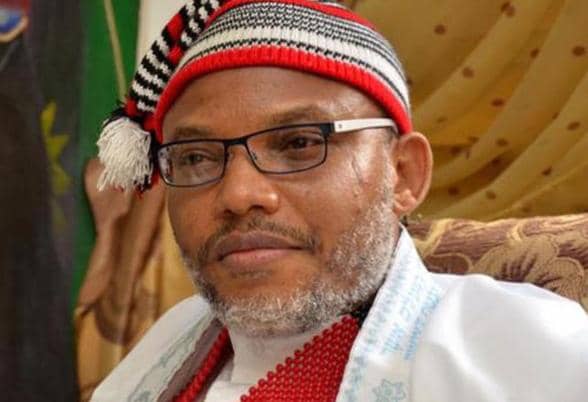
The decision on the restoration of the bail granted to Nnamdi Kanu, the leader of the Indigenous People of Biafra, has been scheduled by the Federal High Court in Abuja for May 20, following separate applications presented before the court.
Also to be considered on the same date is the plea for the transfer of Kanu from the Department of State Services custody to another facility.
Justice Binta Nyako of the Federal High Court had granted Kanu bail on health grounds back in April 25, 2017.
Kanu, who is facing terrorism charges, had left the country following a military raid on his residence.
Since his re-arrest in Kenya on June 19, 2021, and subsequent repatriation to Nigeria, he has been held in DSS custody.
His request for a new bail was turned down by Justice Nyako on March 19, 2024.
The court had promised an expedited hearing while adjourning the case to the present day.
During the hearing, Kanu’s lawyer, Alloy Ejimakor, presented two motions, one of which sought the transfer of Kanu from DSS custody.
The legal team had previously expressed concerns over lack of access to Kanu by the DSS, hindering their trial preparation.
They threatened to boycott the trial unless the situation improved.
Ejimakor argued that Kanu’s continued detention at the DSS would impede the trial process.
He stated, “We are proposing the transfer of the defendant from DSS detention to similar custody such as house arrest for the purpose of expediting the court’s directives.
“It is not uncommon to have a defendant under house arrest. Sambo Dasuki and Ibrahim El-Zakzaky have experienced this in the past.”
The prosecution counsel, Adegboyega Awomolo (SAN), opposed the motion, arguing it lacked valid grounds.
Awomolo remarked, “This application lacks merit. The court’s decision to keep him there is based on his safety and security. Their concern is convenience, not safety.
“There is no substantial evidence to support their request. They are seeking a less secure location. Recently, an individual escaped from a similar arrangement they are proposing. In addition, several terrorists fled from the custodial center.”
In the motion seeking the reinstatement of Kanu’s bail, Ejimakor urged the court to overturn the decision revoking his bail due to bail jumping allegations.
He argued, “The bail granted in 2017 was revoked on the premise of bail jumping, which he did not commit. I appeal to the court to review the Supreme Court’s finding, which highlighted prosecutorial deception. We have legal precedents supporting this stance.
“According to Section 287, I urge the court to uphold the Supreme Court’s determination.”
Awomolo urged the court to dismiss the motion, emphasizing that the appropriate action to challenge a court ruling is through the appeals process.
He contended, “The court’s jurisdiction is crucial, be it constitutional or statutory. This court lacks authority to grant their requests unless appealed. A court decision must be respected by all parties unless contested through an appeal. The order stands unless overturned by the appeals court.”
After hearing both sides, Justice Nyako adjourned the ruling on the motions to May 20.
She instructed the commencement of Kanu’s trial as previously planned.
However, Ejimakor declared that the defendant was not prepared for trial and insisted that no lawyer would proceed under such circumstances.
Despite attempts to convince Ejimakor to proceed with the trial, he remained steadfast, leading the judge to threaten an indefinite adjournment.
Upon request, the judge granted a 10-minute recess for Ejimakor to consult with the defendant before returning to court.
Upon resuming, Ejimakor reiterated that the defendant was not ready for trial.
Countering, Awomolo urged the court not to allow the defendant’s counsel to dictate the court proceedings.
He stated, “We are ready for trial with all necessary exhibits. We have provided the defendant with all required documentation. The court does not stall waiting for the defendant; court proceedings cannot be dictated by the defendant.”
Nyako concluded by adjourning the case to May 20 for a final decision on the matter.
